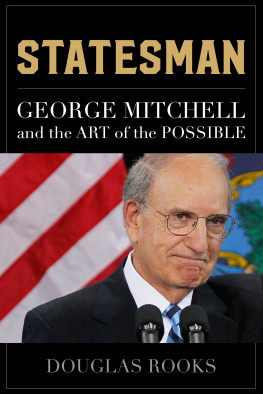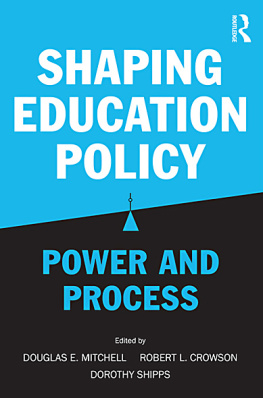Statesman
Statesman
George Mitchell and the Art of the Possible
Douglas Rooks

Camden, Maine
Published by Down East Books
An imprint of The Rowman & Littlefield Publishing Group, Inc.
4501 Forbes Boulevard, Suite 200, Lanham, Maryland 20706
www.rowman.com
Unit A, Whitacre Mews, 26-34 Stannary Street, London SE11 4AB, United Kingdom
Distributed by NATIONAL BOOK NETWORK
Copyright 2016 by Douglas Rooks
Interior photographs courtesy of the George J. Mitchell Dept. of Special Collections & Archives, Bowdoin College Library
 This publication funded in part by a grant from the Maine Arts Commission, an independent state agency supported by the National Endowment for the Arts.
This publication funded in part by a grant from the Maine Arts Commission, an independent state agency supported by the National Endowment for the Arts.
All rights reserved . No part of this book may be reproduced in any form or by any electronic or mechanical means, including information storage and retrieval systems, without written permission from the publisher, except by a reviewer who may quote passages in a review.
British Library Cataloguing in Publication Information Available
Library of Congress Cataloging-in-Publication Data
Names: Rooks, Douglas, 1953 author.
Title: Statesman : George Mitchell and the art of the possible / Douglas Rooks.
Description: Camden, Maine : Down East Books, 2016. | Includes index.
Identifiers: LCCN 2016006454 (print) | LCCN 2016012669 (ebook) | ISBN 9781608933976 (cloth : alk. paper) | ISBN 9781608933983 (electronic)
Subjects: LCSH: Mitchell, George J. (George John), 1933 | LegislatorsUnited StatesBiography. | United States. Congress. SenateBiography. | United StatesPolitics and government19811989. | United StatesPolitics and government19891993. | United StatesPolitics and government19932001.
Classification: LCC E840.8.M545 R66 2016 (print) | LCC E840.8.M545 (ebook) | DDC 328.73/092dc23
LC record available at http://lccn.loc.gov/2016006454
 The paper used in this publication meets the minimum requirements of American National Standard for Information SciencesPermanence of Paper for Printed Library Materials, ANSI/NISO Z39.48-1992.
The paper used in this publication meets the minimum requirements of American National Standard for Information SciencesPermanence of Paper for Printed Library Materials, ANSI/NISO Z39.48-1992.
Printed in the United States of America
For Janine,
who listens to all my stories
Introduction
W hen I was a young committee staffer in the United States Senate more than forty years ago, I noticed an interesting thing: It mattered who showed up. The outcome of a committee session was almost completely determined by the passions, prejudices, perseverance, and personality of the individual members (and their staffers) who were in the room and engaged in the proceedings.
This may sound a little obvious, but my somewhat naive assumption going in was that public policy was largely predetermined by outside forces, and was like a big wheel, slowly grinding on its inevitable way, without much reference to the people involved. Outside forcesthe issues which engaged public interest at the moment, the evolution of ideas, economic and cultural conditions, political realitiesall played a major role in the discussion and debate, of course, but it was the flesh-and-blood protagonists at the table who made particular policies happen.
So if the people were important, what made them so? What were the qualities and characteristics which made some effectiveand some less soin imposing their will on the process? In short, what is leadership and how do we learn to practice it?
A lifetime of thinking about these questions (and ten years of trying to teach them at Bowdoin and Bates Colleges) has led me to several conclusions. The first is that leadership is not magic, not some mysterious elixir which, if drunk at birth, instills the ability to move people in one direction or another. It is, instead, a complicated series of personality and character traits which, when found in the right combination at the right time, can make a business successful, lead to victory on the battlefield, or even bend the arc of history.
The first questionwhat is leadershipis hard and has many answers, depending upon the demands of the times and the circumstances. But the secondhow do we learn to practice itis easier and brings me to this important book.
The best way to learn anything is by experience. The word hot didnt mean much to our son until he touched a light bulb; after doing so, he understood its meaning all too well. Of course, we cant directly experience all the challenges and circumstances which formed Lincoln, Churchill, or Bill Belichick, but we can study their personalities, their decisions, and the personal histories which formed them. History is, in reality, nothing more than condensed experienceand it is a powerful and indispensible teacher.
In the pages which follow, Doug Rooks is the ever-present observer who not only recounts the exceptional life of his subject, but also analyzes and interprets so that the book not only informs, but also teaches. In this sense, the book is as much leadership manual as biography; George Mitchell is not only subject, but becomes mentor as well.
Doug is that rare journalist who moves easily between reporter and columnist (both of which he has been over the years), the latter giving context and depth to people and events. I believe it also helps that Doug has his roots in Maine, for the story of George Mitchell is deeply intertwined with mid-twentieth-century Maine and the sense of the possible that imbued that eras politics.
The (hi)story of any leader begins at home, in the earliest days. And the first chapter of this book explains a lot about George Mitchellhis competitiveness, his intellect (which manifested itself in an early addiction to comic books, which I have noticed also in the early years of some of my brightest friends), his deep appreciation of the struggles of ordinary people, his pluck (theres no other word for someone who hitchhikes to his firstand onlycollege interview), his understanding of the importance of others in helping him along his journey, and his lifelong experience of the opportunity at the heart of the American idea.
I have found over the years that self-made success storiespeople who rise to great heights from humble beginningsseem to fall into two categories. The first are those who think they did it all by themselves and have little sympathy for anyone caught in their former circumstances. The government, which provided a free education, the infrastructure of daily life, and basic security through the system of laws and rules which allowed them to rise, is suddenly the enemy, especially as it tries to help the next generation of upward strivers.
The second group, however, are people like George Mitchell, who fondly recalls lessons from his immigrant(!) mother who worked the night shift in textile mills her whole life, the local businessman who steered him to college, and the mentor in Ed Muskie who taught him the power of politics to make real the promise of American life. Its no coincidence that when he decided to leave the Senate, George chose to devote his unspent campaign funds and a considerable share of his personal energy and commitment to providing scholarships to Maine kids who might not otherwise make it to college. Perfect.
George Mitchell is a leader by any definition; few of us will ever match his achievements. But by sharing in his experience, as we do through this extraordinary book, we can learn something importantnot only about leadership, but perhaps just as importantly, about our country as well.
Next page









 This publication funded in part by a grant from the Maine Arts Commission, an independent state agency supported by the National Endowment for the Arts.
This publication funded in part by a grant from the Maine Arts Commission, an independent state agency supported by the National Endowment for the Arts. The paper used in this publication meets the minimum requirements of American National Standard for Information SciencesPermanence of Paper for Printed Library Materials, ANSI/NISO Z39.48-1992.
The paper used in this publication meets the minimum requirements of American National Standard for Information SciencesPermanence of Paper for Printed Library Materials, ANSI/NISO Z39.48-1992.